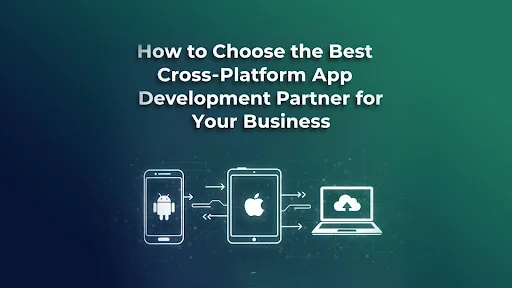A good app can open new revenue streams and strengthen your brand, but choosing the wrong development partners can have the opposite effect. Missed deadlines, broken features, and apps that fail in the real world, waste of money, and weaken customers’ trust. Once the trust is lost, it is difficult to win back at Cross-Platform App Development.
The right partner for cross-platform app development avoids these risks. They make apps that easily run on both Android and iOS, align features with your business goals, and plan the development process from the beginning. With the right team, your app becomes more than software. It becomes a reliable tool that scales as your business grows and continues to deliver value for your users over time.
Continue your journey with handpicked content—read the related post here today.
Understand Your Project Needs
Every successful app starts with clear requirements. Before reaching out to developers, define the following:
- Essential features
All app functions must be written down. The main focus should be on solving the user problem. Further features may come later - Platforms to support
Decide if you need Android, iOS, or both. Consider tablets, OS versions, and devices for broader reach. - Target audience
Identify the age, location, and behavior of your users. Design and features should meet their requirements. - Budget and deadlines
Be realistic. Include costs for development, testing, launch, and continuous support. - Success metrics
Set an average goal such as downloads, storage, engagement, or revenue. The metric guide improved after launch.
Use Cases to Consider before Partnering with App Development Company
- One startup started working with an app development company. They made a big mistake by not doing proper research about the company and didn’t clear their questions. Their app turned into a patchwork of glitches, missed the launch date, and bills piled up.
They switched teams later. The new app development company took time to sort out the problems, tied every requirement and feature to what mattered for their business. The new app was launched without any problems, earned strong reviews, and got high downloads.
- A retail company was facing a similar problem. They picked up the cheapest bid without asking for long-term support. The app looked good at launch, but soon slowed down as users increased.
Crashes become common, and sales are reduced. After hiring a more experienced app development company, which built the app on a scalable framework. This version handled the development well and became a steady source of income.
Evaluate the Technical Expertise of Mobile App Development Company
How smoothly your app runs comes down to how good a team is at handling things. Look at how well they work with:
- Frameworks like Flutter, React Native, or Xamarin, which one should be considered
- Check if they can tie the APIs and databases together
- See if they know their way around cloud suitable technologies like AWS, Google Cloud and Azure
- Pay attention to strong security and fast performance, both matters
Framework Overview
- Flutter delivers fast performance and a consistent UI
- React Native has wide adoption and plenty of plugins
- Xamarin fits well into Microsoft environments with code-sharing benefits
- Native development works best for complex or high-performance features
Industry examples
- Retail apps often include payment, catalogs, push notifications, and loyalty programs
- The healthcare apps may require HIPAA compliance encryption, and patient portals
- Education apps work best with interactive lessons, quizzes, and progress tracking
- Logistics apps depend on GPS tracking, dashboards, and real-time updates
Choose an app development partner familiar with your preferred framework and proven results in similar projects.
Assess Communication and Collaboration
Strong communication reduces the risk and keeps projects on track. A reliable app development partner communicates openly, responds quickly to questions, explains technical words in a single language and includes you in reviews and milestone checks.
Many teams use project management tools like Jira, Trello or Asana to provide regular weekly or fortnightly updates which help them prevent all the errors. Open communication also makes it easier to adjust when market changes or shifting business priorities require updates to the project.
Understand Their Development Process
Ask your partner to explain their workflow. A good process usually includes UI/UX design, development with code reviews, testing and quality assurance, and deployment with post-launch support.

Review Experience and Reputation
Past work shows reliability. Check for:
- Client testimonials and references
- Case studies with measurable results
- Check their reviews on platforms like Clutch and GoodFirms
- Company stability and years in business
- Awards or industry recognition
Consider Cost and Value
Price matters, but long-lasting value means more. Fewer initial quotes can be risky if they hide costs or exclude important services.
Hourly vs fixed pricing: Hourly rates offer flexibility for changing needs, but costs can rise quickly. Fixed pricing keeps budgets predictable, but only works if project requirements are clearly defined upfront.
What’s included in the package: Some companies just write code and walk away. Others stick around for the design, testing, setup and fixing stuff if it breaks. Double-check what’s in the deal so you’re not smacked with surprise fees later.
Long-term support & updates: Apps require maintenance, bug fixes, and upgrades for new devices. A partner who provides long-term support ensures that your app remains stable, secure, and useful after launch.
Hidden costs: Watch out for hidden costs. Plugins, tweaks and extra features usually mean more money. Ask right away about possible extras (better now than scrambling later) and keep your budget safe.
Making the Final Choice
When you’ve gathered all the details, take these steps:
- Compare proposals on skills, process, and cost
- Meet shortlisted teams and ask about workflows
- Try a small pilot project if needed
- Check cultural and communication fit
- Confirm long-term support availability
Conclusion
It’s about finding the right cross-platform app development company that understands your business, communicates openly, and delivers the work you can trust. A reliable partner, such as IR Solutions mobile app development company, clearly defines the requirements, uses a perfect structure, follows strong security practices, and supports you after launch.
When you review the experience, previous results, and their approach to scalability and compliance, you reduce the risk and create confidence in the result. The right choice leads to an app that works well, grows with your users, and supports your business for an extended period of time.
Keep exploring ideas that fuel creativity—click to explore more insights today.







